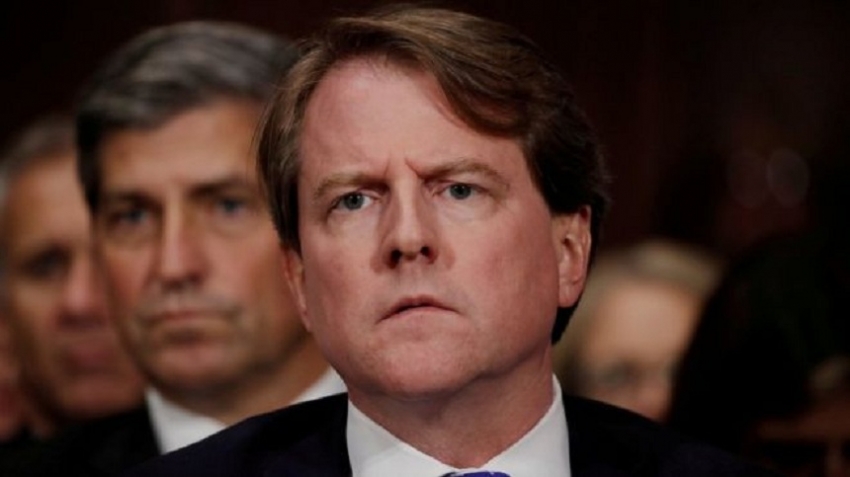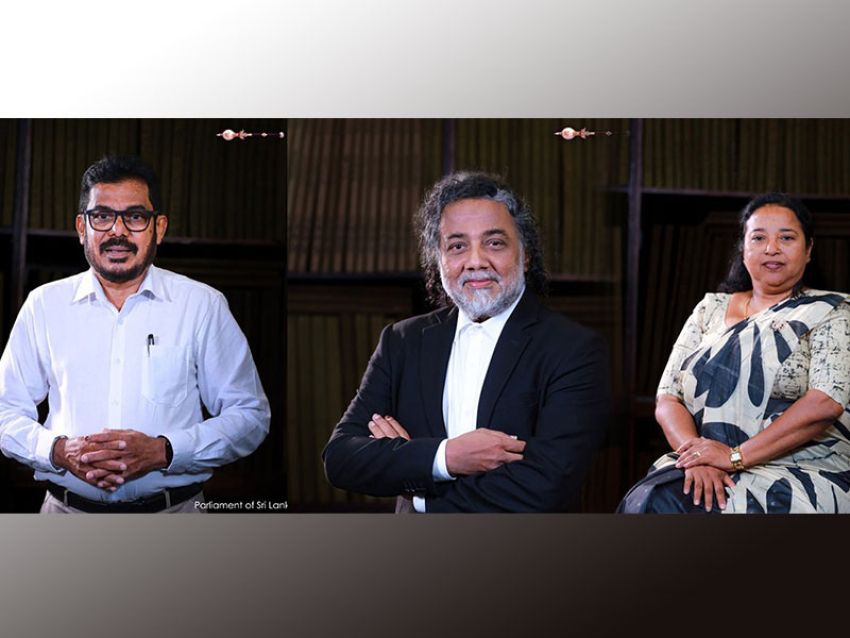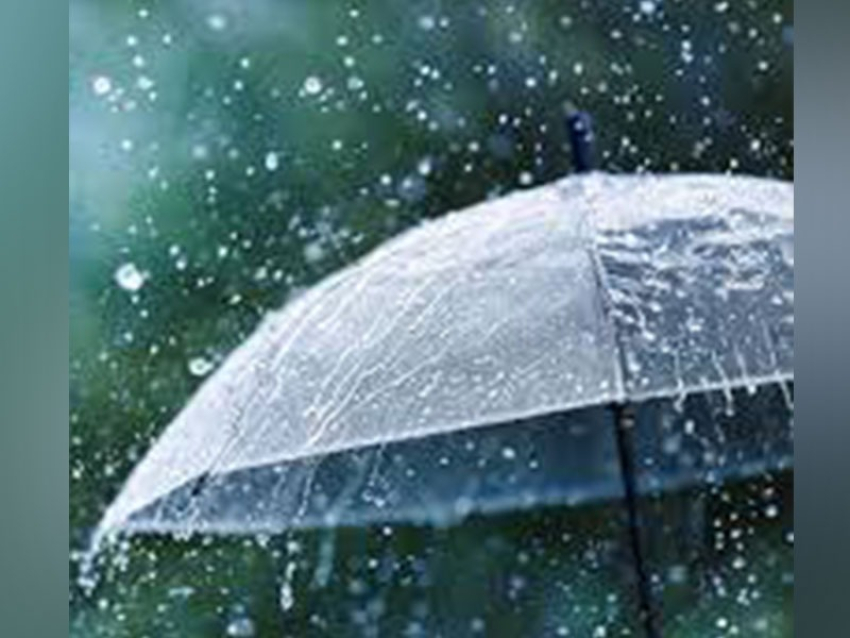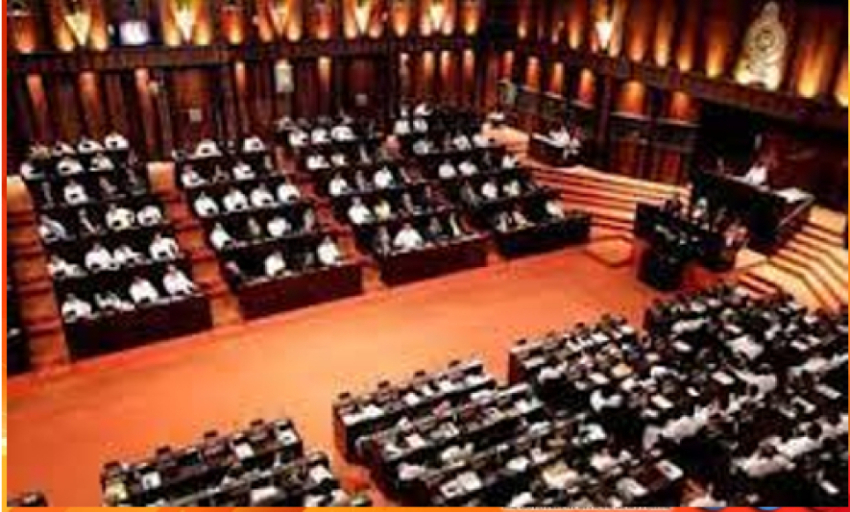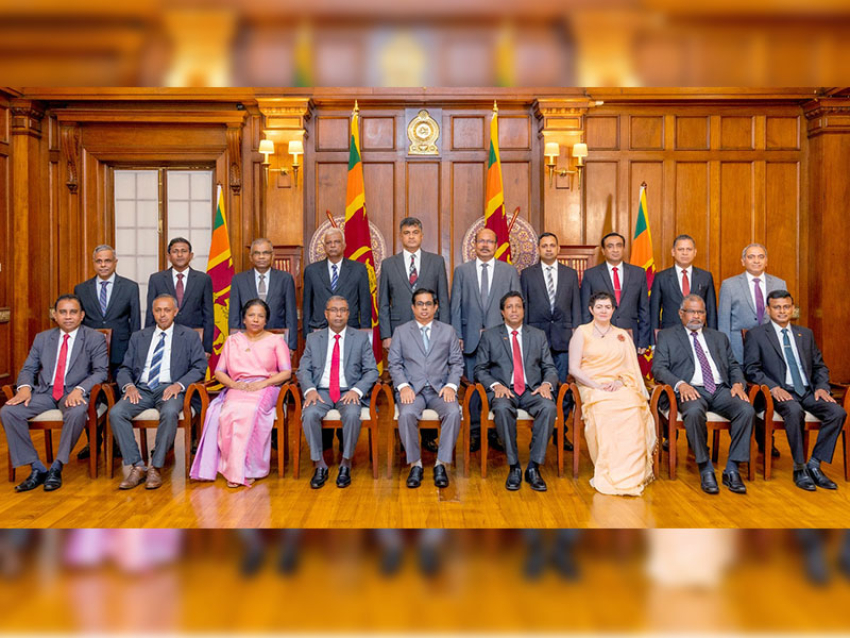Don McGahn must testify in the impeachment inquiry, a judge has ruled A federal judge has ruled that White House staff can be made to testify before Congress, rejecting the Trump administration's claims of immunity.The ruling specifically compels former White House counsel Don McGahn to testify to an inquiry into Russian interference in the 2016 US election.But it also has major implications for the Democrat-led impeachment inquiry against President Donald Trump.The Department of Justice says it will appeal the ruling.
The impeachment inquiry is trying to establish whether Mr Trump pressured Ukraine's president to investigate his political rival Joe Biden. The Trump administration has refused to cooperate with the impeachment inquiry and other Democrat-led investigations, directing current and former White House officials to defy subpoenas for testimony and documents.
Mr McGahn, who left his post in October 2018, was called to appear before the House Judiciary Committee in May to answer questions about the president's attempts to impede the now-concluded Mueller investigation into Russian involvement in the 2016 presidential election.But in her ruling, US District Judge Ketanji Brown Jackson said that "no one is above the law".
"Executive branch officials are not absolutely immune from compulsory congressional process - no matter how many times the executive branch has asserted as much over the years - even if the president expressly directs such officials' noncompliance," she wrote.Fiona Hill: UK coal miner's daughter turned top US Russia expertReleased records reveal Pompeo-Giuliani contacts
Who's who in the Trump-Ukraine story?
Judge Jackson also explicitly said the president "does not have the power" to stop his aides from responding to subpoenas from Congress - adding that "presidents are not kings".
"No one, not even the head of the Executive branch, is above the law," Judge Jackson said.
But she did say that Mr McGahn could invoke executive privilege "where appropriate", to protect potentially sensitive information.
Judiciary Committee chairman Jerrold Nadler said that he expects Mr McGahn to "follow his legal obligations and promptly appear before the Committee".
Why is Congress investigating Trump?
Monday's ruling could have an effect on who testifies during the current impeachment hearings in Congress.
Democrats may use it to summon figures such as former national security advisor John Bolton and Secretary of State Mike Pompeo.
The impeachment case centres on whether President Trump used the threat of withholding US military aid to pressure Ukraine into investigating a domestic political rival.
At the heart of the impeachment inquiry is a phone call on 25 July this year between Mr Trump and Ukraine's newly elected president, Volodymyr Zelensky.
A phone call between Presidents Trump and Zelensky is at the centre of the impeachment inquiry
During the call, Mr Trump urged his counterpart to look into unsubstantiated corruption claims against Democratic White House contender Joe Biden.
Mr Trump's critics say this alleged political pressure on a vulnerable US ally amounted to abuse of power.
The president has denied any wrongdoing and has called the inquiry a "witch hunt".
What next with the impeachment inquiry?
The Judiciary Committee is expected to begin drafting articles of impeachment - which are the charges of wrongdoing against the president - in early December.
After a vote in the Democratic-controlled House, a trial would be held in the Republican-run Senate.
If Mr Trump was convicted by a two-thirds majority - an outcome deemed highly unlikely - he would become the first US president to be removed from office through impeachment.
The White House and some Republicans want the trial to be limited to two weeks.
Fiona Hill: UK coal miner's daughter turned top US Russia expert
22 November 2019
Share this with Facebook Share this with Messenger Share this with Twitter Share this with Email Share
Related TopicsTrump impeachment inquiry
Image copyrightEPA
Image caption
Fiona Hill is a former White House aide
When former White House national security adviser Fiona Hill took to the stand to testify in the US impeachment inquiry, she began with the story of her life.
Unlike many others speaking in the investigation into US President Donald Trump's dealings with Ukraine, Ms Hill has not always been a US citizen.
The straight-talking Russia expert hails from humble beginnings in the north-east of England.
The 54-year-old told lawmakers of how she came from a family of coal miners who "always struggled with poverty".
"When my father, Alfred, was 14, he joined his father, brother, uncles and cousins in the coal mines to help put food on the table," she explained.
She also confirmed a story which illustrates her own toughness, as well as a sense of humour. At 11 years old, a school boy set her pigtails on fire while she was taking a test. She put the fire out with her own hands and finished the test.
"It had some very unfortunate consequences. Afterwards, my mother gave me a bowl haircut. So for the school photograph... I looked like Richard III," she joked.
Her father's dream
Ms Hill spoke in the inquiry of an affinity she had always felt to the US.
Hailing from the market town of Bishop Auckland in County Durham, Ms Hill noted that "both the region and my family have deep ties to the United States."
"I was born... in the same region George Washington's ancestors came from... My paternal grandfather fought through World War I in the Royal Field Artillery, surviving being shot, shelled, and gassed before American troops intervened to end the war in 1918," she said.
While her father was unable to realise his "dream of emigrating to America", she said he had always hoped that someone in the family would make the move.
What does it take to impeach a president?
The Trump impeachment story explained
The hearing as it happened
For Ms Hill, that opportunity came in the 1980s.
During an academic exchange in the then Soviet Union, she met an American professor who told her about graduate scholarships to the US.
In 1989, Russian-speaking Ms Hill made the move across the Atlantic to study at Harvard University, where she ultimately earned her PhD.
'Land of opportunity'
Ms Hill, who became a US citizen in 2002, says the country has offered her opportunities she "would never have had" in England.
"I grew up poor with a very distinctive working-class accent. In England in the 1980s and 1990s, this would have impeded my professional advancement," she told investigators. "This background has never set me back in America."
In a career spanning nearly three decades, she has established herself as a top expert on the former Soviet Union and describes herself as a "nonpartisan, nonpolitical national security professional".
She has worked closely with three presidents - George W Bush, Barack Obama and Donald Trump - to offer expert advice on Russia and the former Soviet republics.
It is her role on Mr Trump's National Security Council (NSC) that has brought her to the impeachment inquiry.
The Trump scandal
According to the New York Times, Ms Hill's decision to accept a role in the NSC in 2017 "strained friendships and made her a target of right-wing conspiracy theorists who spread rumours that she was a Democratic mole".
Ms Hill told the inquiry that when she accepted the position she thought she could help with Mr Trump's "stated goal of improving relations with Russia, while still implementing policies designed to deter Russian conduct that threatens the United States".
But, she said, the president disregarded the advice of senior advisers who said Russia had meddled in the 2016 election, instead listening to the views of his personal lawyer Rudy Giuliani and pushing a false theory that it was Ukraine.
She told lawmakers this was a "fictional narrative that has been perpetrated and propagated by the Russian security services themselves."
While Ms Hill stepped down shortly before the phone call at the centre of the inquiry, she witnessed earlier talks between US and Ukrainian officials in which she said a deal between the two presidents was mentioned.
Media captionSondland was involved in a "domestic political errand" for Trump
Ms Hill told the inquiry of a "couple of testy encounters" she had with ambassador to the European Union Gordon Sondland over Ukraine, because he did not keep her informed of "all of the meetings he was having".
On one occasion, she said: "I was actually, to be honest, angry with him. And I hate to say it but often when women show anger it's not fully appreciated, it's often pushed off onto emotional issues, perhaps, or deflected on other people."
The remark and wider testimony earned her praise on social media, where she was described as relatable and courageous.
But the attention was not something she was looking for when she stepped away from the NSC, apparently hoping to spend more time with her family.
"I don't think she was thinking, 'I'm going to go out in a blaze of glory, take a moral stand and testify.' That was definitely not her intention. She just wanted to do her job with no fuss or drama," her former colleague and friend Tom Wright told the New York Times.
Released records reveal Pompeo-Giuliani contacts
23 November 2019
Share this with Facebook Share this with Messenger Share this with Twitter Share this with Email Share
Related TopicsTrump impeachment inquiry
Media captionThis week's impeachment hearings in three minutes
The US State Department has released records relating to the Trump administration's dealings with Ukraine.
Documents were released to the ethics watchdog American Oversight after a freedom of information request.
The records show repeated contacts between Secretary of State Mike Pompeo and Mr Trump's personal lawyer Rudy Giuliani.
US ties with Ukraine are at the centre of an impeachment investigation against Mr Trump.
The president is accused of withholding aid to Ukraine that had been approved by Congress to pressure the country into investigating his political rival Joe Biden.
Five key moments from impeachment hearing
Sondland's testimony and reaction
Mr Trump has declared the inquiry a "witch hunt" and denies any wrongdoing.
What do the documents say?
Mr Giuliani has been accused of trying to discredit former Ukraine ambassador Marie Yovanovitch while running a shadow US foreign policy on Ukraine. There have been questions over what Secretary of State Mike Pompeo knew.
The records show Mr Pompeo and Mr Giuliani repeatedly spoke to one another - although the topics of those conversations remain unknown.
Emails among the documents suggest the pair spoke on the phone on 27 and 29 March.
The second call came after Mr Giuliani's staff emailed a personal assistant to President Trump, Madeleine Westerhout, to ask if she had a phone number for Mr Pompeo.
Media captionMr Giuliani is alleged to have sought to dig up dirt on Democrat candidate Joe Biden
Ms Yovanovitch was dismissed as ambassador to Ukraine in May.
"We can see why Mike Pompeo has refused to release this information to Congress. It reveals a clear paper trail from Rudy Giuliani to the Oval Office to Secretary Pompeo to facilitate Giuliani's smear campaign against a US ambassador," said American Oversight Executive Director Austin Evers in a statement.
"This is just the first round of disclosures. The evidence is only going to get worse for the administration as its stonewall strategy collapses in the face of court orders."
Who's who in Trump-Ukraine story?
Why Ukraine is so important to the US
Ms Yovanovitch testified to the impeachment inquiry last week that she was fired over "false claims" by people with "questionable motives". She believes her anti-corruption efforts angered influential Ukrainians who then sought to remove her.
The president attacked her in a tweet while she was giving her testimony. The diplomat said it was "very intimidating".
Media captionTrump's live-tweets "very intimidating" - Yovanovitch
President Trump again attacked Ms Yovanovitch in a phone call to Fox News on Friday, saying she "wouldn't hang my picture in the embassy" and "was not an angel".
But a letter dated 5 April included in the document cache - signed by six former US ambassadors to Ukraine - expresses concern about the allegations against Ms Yovanovitch, describing them as "simply wrong".
"Ambassador Yovanovitch... has a flawless record as a diplomat," the letter reads. "She is a professional of the highest integrity."
What's the impeachment inquiry about?
The US president is accused of withholding US military aid to pressure Ukraine into investigating a domestic political rival.
At the heart of the inquiry is a phone call on 25 July this year between Mr Trump and Ukraine's newly elected president.
On the call, Mr Trump urged his counterpart to look into unsubstantiated corruption claims against Democratic White House contender Joe Biden.
Mr Giuliani has been central in pushing those allegations. He has been subpoenaed for documents by impeachment investigators but has previously said he won't co-operate with Democrats.
Mr Trump's critics say this alleged political pressure on a vulnerable US ally amounted to abuse of power. The president strongly denies any wrongdoing.

